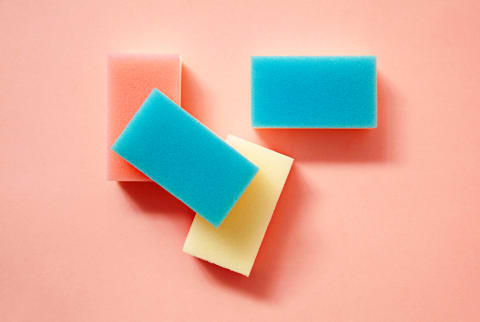What Research & Experts Say About Microwaving Sponges To Get Rid Of Germs


Do you ever look at your kitchen sponge and wonder if there's anything you can really do to make sure it's germ-free? Some people opt to throw their sponges in the microwave thinking it will zap away any germs, but we were curious: Does that actually do anything?
In honor of one of the biggest eating (and by extension, dish scrubbing) days of the year, Thanksgiving, we consulted the research and asked an expert to weigh in. Here's what to know.
Does microwaving sponges actually work?
Based on the existing research, the jury is still out on whether microwaving sponges is actually beneficial. According to one 2017 study1, researchers found microwaving, along with boiling, can significantly reduce the bacterial load of sponges, but that doesn't mean we should all be doing it.
"Results were contradictory," the study authors write, "for example showing effectiveness in the laboratory but not in used kitchen sponges, and no method alone seemed to be able to achieve a general bacterial reduction of more than about 60%."
This isn't ideal, they note, hypothesizing that resistant bacteria that survive the sanitation process can rapidly re-colonize (similar to the effect of antibiotics on the gut), which could promote more harmful bacteria in the sponges.
In another study conducted in 20202, researchers note microwaving sponges does appear to alter the composition and metabolic properties of the microbial communities, but more research is needed to determine if those changes are good or bad for our health.
An expert weighs in.
To get an expert's take on the question of whether to microwave your sponge, we asked Peter Miller, author of How To Wash the Dishes. While he could neither confirm nor deny this cleaning method's effectiveness, much like the research on the topic, he did have some noteworthy points to add.
For one thing, he says, "Always rinse your sponge with cold water. It will help keep the bacteria down." Additionally, he tells mbg that some cultures avoid sponges altogether, from Sweden to New Zealand to Japan. Instead, they use a dishcloth, which Miller notes does not sour and can be rinsed completely.
The bottom line.
If you're worried your sponge might be harboring germs, your safest bet may very well be to toss it—especially if you don't have a dishwasher to ensure your dishes truly get sanitized. Or perhaps you decide to swap out your sponges altogether for dishcloths you can wash more easily. Either way, the lesson here is this: If your sponge is getting grimy, it's probably not worth saving.

Sarah Regan is a Spirituality & Relationships Editor, a registered yoga instructor, and an avid astrologer and tarot reader. She received her bachelor's in broadcasting and mass communication from State University of New York at Oswego, and lives in Buffalo, New York.